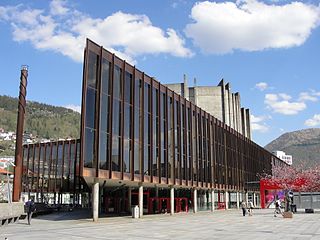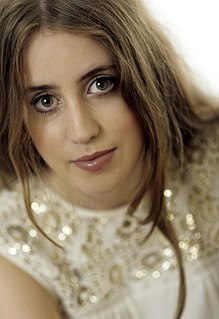Related Research Articles

Isaac Stern was an American violinist.

In music, a cadenza is, generically, an improvised or written-out ornamental passage played or sung by a soloist or soloists, usually in a "free" rhythmic style, and often allowing virtuosic display. During this time the accompaniment will rest, or sustain a note or chord. Thus an improvised cadenza is indicated in written notation by a fermata in all parts. A cadenza will usually occur over the final or penultimate note in a piece, the lead-in or over the final or penultimate note in an important subsection of a piece. It can also be found before a final coda or ritornello.

Nigel Kennedy is an English violinist and violist. His early career was primarily spent performing classical music, and he has since expanded into jazz, klezmer, and other music genres.

Jascha Heifetz was a Russian-American violinist. Born in Vilna (Vilnius), he moved as a teenager to the United States, where his Carnegie Hall debut was rapturously received. He was a virtuoso since childhood—Fritz Kreisler, another leading violinist of the twentieth century, said on hearing Heifetz's debut, "We might as well take our fiddles and break them across our knees." He had a long and successful performing career. However, after an injury to his right (bowing) arm, he switched his focus to teaching.
The Gramophone Classical Music Awards, launched in 1977, are one of the most significant honours bestowed on recordings in the classical record industry. They are often viewed as equivalent to or surpassing the American Grammy award, and referred to as the Oscars for classical music. They are widely regarded as the most influential and prestigious classical music awards in the world. According to Matthew Owen, national sales manager for Harmonia Mundi USA, "ultimately it is the classical award, especially worldwide."

The Bergen Philharmonic Orchestra is a Norwegian orchestra based in Bergen. Its principal concert venue is the Grieg Hall.
Peter Manning FRSA is a British conductor and violinist.

Julia Fischer is a German classical violinist and pianist. She teaches at the Munich University of Music and Performing Arts and performs up to 60 times per year.

Julian Rachlin is a Lithuanian-born violinist, violist and conductor.

Tim Kliphuis is a Dutch violinist renowned for mixing gypsy jazz with classical and folk music.

Albert Edward Sammons CBE was an English violinist, composer and later violin teacher. Almost self-taught on the violin, he had a wide repertoire as both chamber musician and soloist, although his reputation rests mainly on his association with British composers, especially Elgar. He made a number of recordings over 40 years, many of which have been re-issued on CD.
Gordan Nikolitch, also spelled Gordan Nikolić, is a Franco-Serbian violinist. He was the first concertmaster of the London Symphony Orchestra for nearly 20 years, having stepped down in October 2017 to concentrate on directing and teaching.
Erich Gruenberg was an Austrian-born British violinist and teacher. Following studies in Israel, he was a principal violinist of major orchestras, including the Royal Stockholm Philharmonic Orchestra, the London Symphony Orchestra and the Royal Philharmonic Orchestra. He was an international soloist, playing the first performance of Britten's Violin Concerto in Moscow. As a chamber musician, he was leader of the London String Quartet and recorded all Beethoven violin sonatas with pianist David Wilde. He was the lead violinist for The Beatles' album, Sgt. Pepper's Lonely Hearts Club Band. Gruenberg taught at the Royal Academy of Music until age 95, influencing generations of violinists.
Britten Sinfonia is a chamber orchestra ensemble based in Cambridge, UK. It was created in 1992, following an initiative from Eastern Arts and a number of key figures including Nicholas Cleobury, who recognised the need for an orchestra in the East of England. It is a flexible ensemble composed of chamber musicians in Europe. The players are freelance musicians who are employed on a project-by-project basis and the ensemble performs around 70 concerts per year and works with hundreds of people in the communities where the orchestra is resident.
Jean Pougnet was a Mauritian-born concert violinist and orchestra leader, of British nationality, who was highly regarded in both the lighter and more serious classical repertoire during the first half of the twentieth century. He was leader of the London Philharmonic Orchestra from 1942 to 1945.

Jeremy Denk is an American classical pianist.

Lara Melda Ömeroğlu, known professionally as Lara Melda, is a British-Turkish concert pianist.
Charlotte Bray is a British composer.
Matthew Barley is an English cellist. He is best known for his performances of core classical music, improvisation, and contemporary music including electronics.

Vilde Frang Bjærke is a Norwegian classical violinist.
References
- 1 2 3 Morley, Christopher (22 March 2013). "Violin virtuoso Thomas Gould talks jazz, busking and performing in Birmingham". Birmingham Post . Birmingham . Retrieved 9 December 2015.CS1 maint: discouraged parameter (link)
- ↑ "Thomas Gould violin; Ana-Maria Vera piano: Lisa Peacock Presents Thursday Lunchtime Showcases". Wigmore Hall . Retrieved 9 December 2015.CS1 maint: discouraged parameter (link)
- 1 2 3 4 5 "About the performer: Thomas Gould". Los Angeles Philharmonic . Retrieved 10 December 2015.CS1 maint: discouraged parameter (link)
- 1 2 Hewett, Ivan (21 April 2011). "New face: Thomas Gould". The Daily Telegraph . London. Retrieved 9 December 2015.CS1 maint: discouraged parameter (link)
- 1 2 Maddocks, Fiona (26 April 2015). "Thomas Gould: Live in Riga review – poetic and elegant in Beethoven and The Lark Ascending". The Observer . London. Retrieved 9 December 2015.CS1 maint: discouraged parameter (link)
- ↑ "Thomas Gould". Britten Sinfonia . Retrieved 9 December 2015.CS1 maint: discouraged parameter (link)
- ↑ Curtis, Nick (7 February 2013). "The great British busk-off: what happened when a world-class violinist played on the London Underground?". London Evening Standard . London. Retrieved 9 December 2015.CS1 maint: discouraged parameter (link)
- ↑ Gould, Thomas (26 November 2014). "Thomas Gould: from Mahler to Radiohead, variety is the spice of life". The Guardian . London. Retrieved 9 December 2015.CS1 maint: discouraged parameter (link)
- ↑ Scotney, Sebastian (8 February 2016). "Fiona Monbet to replace Thomas Gould in The Man Overboard Quintet". LondonJazzNews. Retrieved 2 March 2016.CS1 maint: discouraged parameter (link)